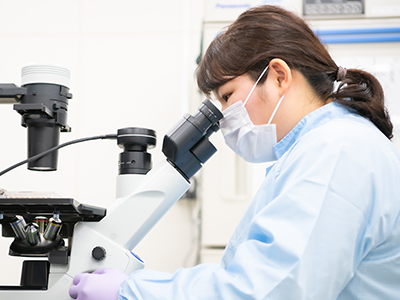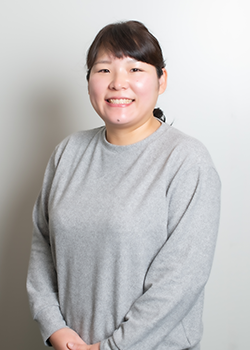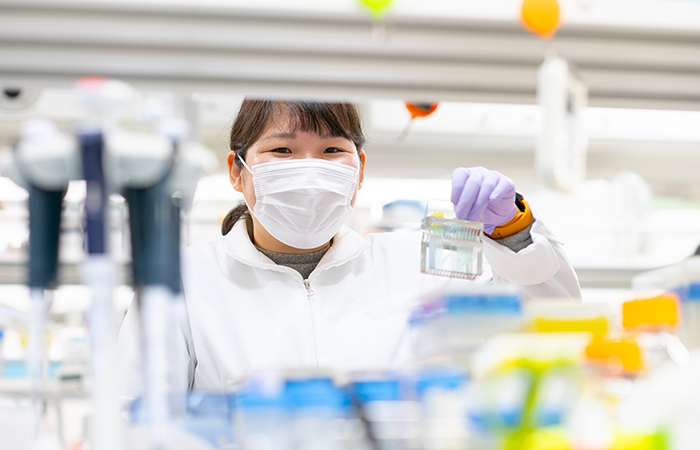Supporting Drug discovery and development Research Using Disease-specific iPS cells
BRC is supported by a diverse staff who are involved in a variety of tasks. We have interviewed staff members from each of the 12 laboratories that make up BRC, asking them about their activities and their day-to-day efforts in their research rooms.
This time, we are speaking with Ran Shibukawa, who works in a Technical Staff II position in the iPSC-based Drug Discovery and Development Team.
We asked her, who is one of the key staff members of the current team, which has been at the forefront of drug discovery and pathological condition research using iPS cells since its establishment, about how she came to start his present job and what she finds rewarding about it.
About the team’s mission and work
Our development team is based at Keihanna Campus (in Kansai Science City, located in the border region between the three prefectures of Kyoto, Osaka and Nara). The team is engaged in developing drug discovery platforms using disease-specific iPS cells provided by BRC’s Cell Engineering Division. We have established a method to generate and analyze cells from various organs by using disease-specific iPS cells derived from patients. We are developing fundamental technologies for elucidating pathological conditions and drug development, such as culture techniques, gene expression, protein detection, cellular function analysis, and screening technologies to select substances that exhibit drug efficacy.
As a technical staff member of this team, I am involved in supporting research experiments centered on cell culture of disease-specific iPS cells, as well as managing and ordering consumables and reagents for use in laboratory work. The disease-specific iPS cells we handle extremely valuable cells from patients. We carefully culture them while keeping in mind that we are entrusted with the patients’ thoughts and feelings.
From a love of animals to a career in cell culture
Exposure to iPS cell research

Originally, I worked in the breeding and management of experimental animals. It all started because of my love of animals, but when I was considering a career change, I was offered a chance to work in cell culture, where I was told, "Don’t worry if you don’t have any experience; we will teach you about the cells we handle and our research from the ground up." This led me to my current career in cell culture.
I first worked on cell culture in the laboratory of Dr. Shinya Yamanaka at Kyoto University. I joined the laboratory at around the time that an important paper on the creation of iPS cells was being published, so my work was extremely busy at the beginning. In the laboratory, my job was to support one researcher in cell culture and other tasks, but it was a large-scale project, and it was very difficult for me to handle all the work alone. However, thanks to this training, I was able to acquire skills in a short period of time, which may have helped me to get used to the job faster.
When I first started working with cells, I was sometimes confused. I am not really a science person, and I am not very good with numbers. My previous job in animal breeding and management consisted mostly of physical work, but in the cell culture field, I had to deal with numbers, such as calculating concentrations, which I had never had to do before.
However, I soon got used to it, and after a while, I moved to the laboratory at Kyoto University of Dr. Haruhisa Inoue, the leader of my current team. Later, when Dr. Inoue’s team began working at BRC, I joined them as a technical staff member. Although we are now working with human cells instead of mouse cells, the work we are doing is almost the same as I had been doing before, and in total I have been working in cell culture for about 16 years now.
Is it similar to cooking?
The characteristics and rewards of the work
I think there are many people who can understand the details of cell culture work intellectually, but at the same time they lack a clear idea of what the actual work entails. When I went to an interview for a cell culture job while presuming it be for candidates with no previous experience and was asked, "Are you good at cooking?", I felt as if I had been possessed by a fox.
At first, I had no idea what the question meant, but when I started working, I realized that it was exactly the right question to ask, and I thought, "I see, it is a lot like cooking." It is similar in that the amounts of the various ingredients to be handled are fixed and the process advances according to a written procedure, like a cooking recipe, but when the time comes around to do the same thing again, the results will not be the same unless the experimental conditions the same. In an experiment, it is a really important requirement to do things the way they are supposed to be done.
In fact, I am the type of person who avoids measuring out portions of ingredients by eye, even when cooking, and I tend to be uncomfortable unless I do things meticulously and precisely. I don’t know for myself, but if you want to call it a vocation, then perhaps it is. In the first place, I had no intention of continuing this work for 16 years, but the fact that I am still able to do it now without any problems is probably because I am suited to it. In that sense, I would recommend this job to people who like detailed work, people who are good at cooking, and people who quickly notice even the smallest things.
The reason for "noticing little things" is because cells are living organisms, and even if you are following the protocol, there are times when you need to actually look at the cells and make decisions. Even when the procedure manual tells you to proceed to the next step, there will inevitably be situations in which you feel the timing is a little too early or too late.
Also, the moment you open the incubator in which the culturing is taking place, you may suddenly notice a faint odor. This is also an indication that something is happening. If left unchecked, it can spread and ruin the entire culture, but if you notice it and deal with it immediately, the damage can be minimized. Being able to notice the smallest of things is extremely important, as it can directly affect the future course of the experiment.

In addition to doing things the way they are supposed to be done and being aware of subtle changes, what I value in my work is simply working calmly and carefully.
To help me visualize the specific steps of the culture procedure, I put everything I have been taught into a procedure manual and note in detail the items I need to complete before I can master the skill. I also try not to give up even if I don’t get it right away.
Proceeding with the culture as planned will affect the progress of the experiment. Since I deal with living cells, unexpected things can happen in the field, but I do my best to carry out my duties as smoothly as possible. I feel a sense of fulfillment in knowing that my work supports cutting-edge research, and I will continue to approach cells with a sense of tension every day.
Profile
- Ran Shibukawa
- Technical Staff II, iPSC-based Drug Discovery and Development Team
- Joined RIKEN BRC in 2017. She moved to her current position after working as a technical staff member at Kyoto University, where she provided cell culture support services. Currently, in addition to supporting research experiments centered on cell culture, she is involved in managing and ordering consumables and reagents in the laboratory.
Release date : Oct 24, 2024
